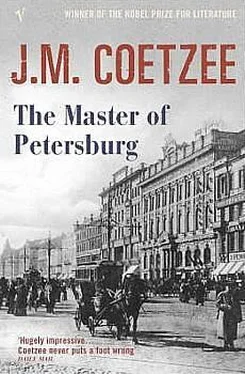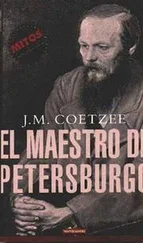'My statement?' he says.
'Yes, your statement. Whatever statement you choose to make. You can write it here and now, it will save time.'
'And what if I choose to tell the truth?'
'Whatever you write we will distribute, I promise.'
'The truth may be more than a hand-press can cope with.'
'Leave him alone.' The voice comes from the other man, still poring over the text in front of him. 'He's a writer, he doesn't work like that.'
'How does he work then?'
'Writers have their own rules. They can't work with people looking over their shoulders.'
'Then they should learn new rules. Privacy is a luxury we can do without. People don't need privacy.'
Now that he has an audience, Nechaev has gone back to his old manner. As for him, he is sick and tired of these callow provocations. 'I must go,' he says again.
'If you don't write, we'll have to write for you.'
'What do you say? Write for me?'
'Yes.'
'And sign my name?'
'Sign your name too – we'll have no alternative.'
'No one will accept that. No one will believe you.'
'Students will believe – you have quite a following among the students, as I told you. Particularly if they don't have to read a fat book to get the message. Students will believe anything.'
'Come on, Sergei Gennadevich!' says the other man. His tone is not amused at all. There are rings under his eyes; he has lit a cigarette and is smoking nervously. 'What have you got against books? What have you got against students?'
'What can't be said in one page isn't worth saying. Besides, why should some people sit around in luxury reading books when other people can't read at all? Do you think Sonya next door has time to read books? And students chatter too much. They sit around arguing and dissipating their energy. A university is a place where they teach you to argue so that you'll never actually do anything. It's like the Jews cutting off Samson's hair. Arguing is just a trap. They think that by talking they will make the world better. They don't understand that things have to get worse before they can get better.'
His comrade yawns; his indifference seems to goad Nechaev. 'It's true! That is why they have to be provoked! If you leave them to themselves they will always slide back into chattering and debating, and everything will run down. Your stepson was like that, Fyodor Mikhail-ovich: always talking. People who are suffering don't need to talk, they need to act. Our task is to make them act. If we can provoke them to act, the battle is half won. They may be smashed, there may be new repression, but that will just create more suffering and more outrage and more desire for action. That's how things work. Besides, if some are suffering, what justice is there till all are suffering? And things will accelerate too. You will be surprised at how fast history can move once we get it moving. The cycles will grow shorter and shorter. If we act today, the future will be upon us before we know it.'
'So forgery is permitted. Everything is permitted.'
'Why not? There's nothing new in that. Everything is permitted for the sake of the future – even believers say so. I wouldn't be surprised if it's in the Bible.'
'It certainly isn't. Only the Jesuits say so, and they will not be forgiven. Nor will you.'
'Not be forgiven? Who will know? We are talking about a pamphlet, Fyodor Mikhailovich. Who cares who actually writes a pamphlet? Words are like the wind, here today, gone tomorrow. No one owns words. We are talking about crowds. Surely you have been in a crowd. A crowd isn't interested in fine points of authorship. A crowd has no intellect, only passions. Or do you mean something else?'
'I mean that if you knowingly bring down suffering on those wretched children next door, in the name of the future, you will not be forgiven, ever.'
'Knowingly? What does that mean? You keep talking about the insides of people's minds. History isn't thoughts, history isn't made in people's minds. History is made in the streets. And don't tell me I am talking thoughts right now. That is just another clever debating trick, the kind of thing they confuse students with. I'm not talking thoughts, and even if I am, it doesn't matter. I can think one thing at one minute and another thing at another and it won't matter a pin as long as I act. The people act. Besides, you are wrong! You don't know your theology! Haven't you heard of the pilgrimage of the Mother of God? On the day after the last day, when everything has been decided, when the gates of hell have been sealed, the Mother of God will leave her throne in heaven and make a pilgrimage to hell to plead for the damned. She will kneel and she will refuse to rise till God has relented and everyone has been forgiven, even the atheist, even the blasphemer. So you are wrong, you are contradicted out of your own books.' And Nechaev casts him a blazing look of triumph.
Forgiveness of all. He has only to think of it and his head spins. And they shall be united, father and son. Because it comes from the foul mouth of a blasphemer, shall it therefore not be the truth? Who shall prescribe where she may make her home, the Mother of God? If Christ is hidden, why should he not hide here in these cellars? Why should he not be here at this moment, in the child at the breast of the woman next door, in the little girl with the dull, knowing eyes, in Sergei Nechaev himself?
'You are tempting God. If you gamble on God's mercy you will certainly be lost. Don't even think the thought – pay heed to me! – or you will fall.'
His voice is so thick that he can barely pronounce the words. For the first time Nechaev's comrade looks up, inspecting him with interest.
As if sensing his weakness, Nechaev pounces, worrying him like a dog. 'Eighteen centuries have passed since God's age, nearly nineteen! We are on the brink of a new age where we are free to think any thought. There is nothing we can't think! Surely you know that. You must know it – it's what Raskolnikov said in your own book before he fell ill!'
'You are mad, you don't know how to read,' he mutters. But he has lost, and he knows it. He has lost because, in this debate, he does not believe himself. And he does not believe himself because he has lost. Everything is collapsing: logic, reason. He stares at Nechaev and sees only a crystal winking in the light of the desert, self-enclosed, impregnable.
'Be careful,' says Nechaev, wagging a finger meaningfully. 'Be careful what words you use about me. I am of Russia: when you say I am mad, you say Russia is mad.'
'Bravo!' says his comrade, and claps his hands in languid mockery.
He tries a last time to rouse himself. 'No, that's not true, that's just sophistry. You are only part of Russia, only part of Russia 's madness. I am the one' – he lays a hand on his breast, then, struck by the affectedness of the gesture, lets it drop again – 'I am the one who carries the madness. My fate, my burden, not yours. You are too much of a child to begin to bear the weight.'
'Bravo again!' says the man, and claps: 'He has got you there, Sergei!'
'So I will make a bargain with you,' he pushes on. 'I will write for your press after all. I will tell the truth, the whole truth in one page, as you require. My condition is that you print it as it stands, without changing a word, and send it out.'
'Done!' Nechaev positively glows with triumph. 'I like bargains! Give him pen and paper!'
The other man lays a board over the composing table and sets out paper.
He writes: 'On the night of October 12th, in the year of our Lord 1869, my stepson Pavel Alexandrovich Isaev fell to his death from the shot tower on Stolyarny Quay. A rumour has been circulated that his death was brought about by the Third Section of the Imperial Police. This rumour is a wilful fabrication. I believe that my stepson was murdered by his false friend Sergei Gennadevich Nechaev.
Читать дальше












